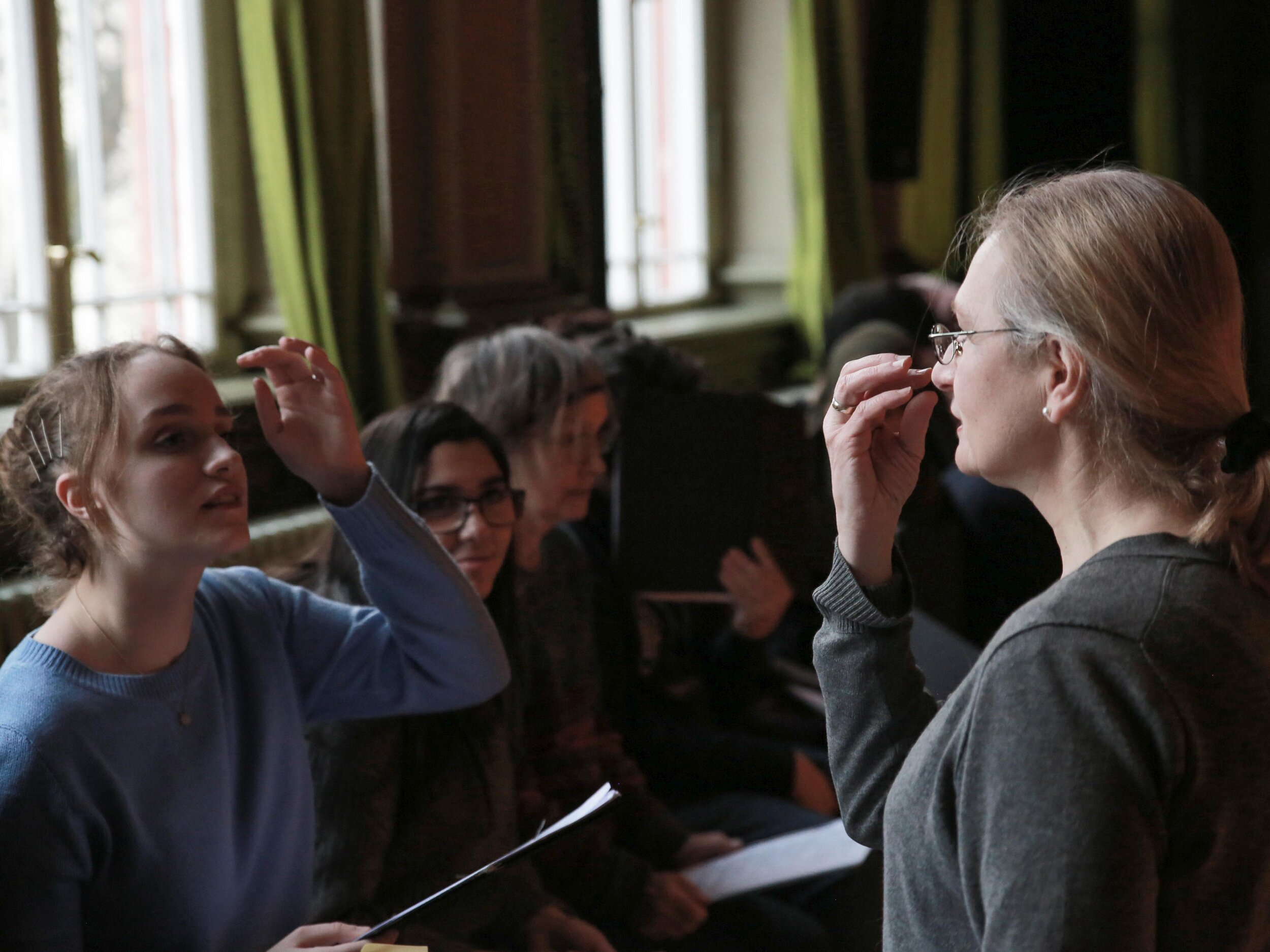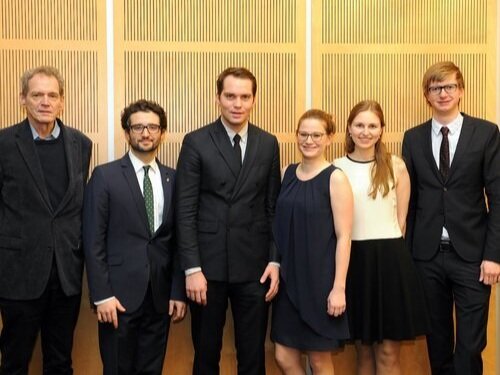Obermayer Award
“I don't try to invent a story. I just use what is written…”
Elisabeth Kahn’s historical productions have a profound impact, especially for the students staging them.
On the 82nd anniversary of Kristallnacht in November 2020, a group of students from a school in Berlin walked out of their modern building and crossed the street to take part in a solemn commemoration of the anti-Jewish attacks of 1938.
While only a few steps, the trip took the students back in time to the former Moabit freight station, where eight decades ago some 35,000 Jews, including the elderly and children, were deported to Nazi extermination camps.
At the outdoor site that comprises the memorial, a class of eighth-graders from the Theodor Heuss Community School (Theodor-Heuss-Gemeinschaftschule) laid sculptures they handcrafted on the rail tracks, including a toy car and a teddy bear, symbols of the toys of the children who perished during the Holocaust. The students placed clay heads they sculpted atop the walls, acknowledging that the deportations took place in public, where neighbors who lived nearby saw the events unfold.
The commemoration was part of a deeper engagement students from the school are undertaking. It features a multidimensional theatrical project using original historical documents that bring to life the story of one teenager, Marianne Sander, and her grandmother, Lise Herbst.
“While the granddaughter can escape at the last minute, the grandmother had to stay behind,” a student recites in a video of the dramatic work.
Most of the school's students are from immigrant families from the Middle East, Afghanistan, the Balkan countries, and Africa, and many are of Muslim faith. They are often largely unfamiliar with the German history and the tragic genocide perpetuated against the Jews.
Three hundred and fifty miles (570 km) to the south, in Augsburg, teens from several of the Bavarian city's schools have participated in a theatrical project about the takeover of two Jewish companies during the years of Nazi rule.
The dramatic production, which includes dance and music and draws on original documents and sources, sheds light on personal family stories from the students' hometown. The project transforms the abstract and remote idea of the Holocaust into an accessible, powerful experience.
The pair of these gripping and poignant theatrical projects are the brainchild of Elisabeth Kahn, a Berlin-based performer and inspired educator who has devoted the past 20 years to working with students on immersive theatrical projects that explore German-Jewish history.
Kahn partners with students and other performers through Dance Theater Dialogue (Tanz Theater Dialoge), an organization she founded in 2009 that melds her dual expertise and passion for performance and education. Working with a multidisciplinary array of artists, the organization has produced some 50 projects that address historical themes and make them relevant to contemporary times.
Kahn's innovative and creative theatrical-pedagogical approach strikes a chord for young people who are generations—and often cultures—away from the tragic historical events of their country's past. Kahn's work stands out for its honesty and its emphasis on local events, say colleagues and students. Most notably, students delve into historical and personal documents and through their performances, give voice to the words of people from the time.
Kahn recognizes the value of academic book learning but says too often, history lessons are abstract.
“But with an example, I can actually understand what it is about. These original documents are so clear and so troubling to read that when you hear them spoken out loud they have a different effect. If it is done well, it can touch ... any age group,” she says. “My intention is not to hit them emotionally but to have them understand cognitively. I don't try to invent a story. I just use what is written, and I don't make a fairy tale out of it.”
The theatrical material, combined with the physical connection to the deporation site across from the school, creates a more meaningful experience for students, says Sabeth Schmidthals, a teacher at the Theodor Heuss school and a 2020 Obermayer Award recipient who has worked with Kahn on several projects.
She and her generation had the chance to speak with Holocaust survivors. “That was very impressive as a teen,” Schmidthals says. With fewer survivors still living or able to visit schools, it is harder for students to experience the power of hearing their stories firsthand, stories that bring to life historical events in such a personal way. “I think these [historical] places can also do that to a certain extent,” she says while standing next to the tracks at the deportation site.
Elisabeth Kahn's theatrical project provides students with a potent, tangible experience. “She takes this place, an authentic space where the students know this actually happened here, and links it to the people who were deported from this place,” Schmidthals says.
Kahn, who grew up in Berlin, began her artistic career as a professional dancer, studying dance in New York, Los Angeles, and Berlin, and performing throughout Europe and the United States. After a successful career in the performing arts, she pursued advanced studies in pedagogy at the Technical University of Berlin. Even as she was performing, she explored focusing an artistic lens on the subject of anti-Semitism.
In some two decades and in the 12 years since launching Dance Theater Dialogue, Kahn has turned her vision into an experience that audiences and students find meaningful.
“The high quality of the presentations and the great commitment of the young people shows how much they have made the topic of anti-Semitism and the fight against prejudice their own. In the end I would say that it’s anti-racism work that we’re doing here.” says Schmidthals.
Schmidthals says that by bringing in professional artists and performers to work with the students, Kahn offers them an opportunity they would otherwise not have and sets a high bar. “It elevates them; they know they are doing something good,” she says.
“...[T]he great commitment of the young people shows how much they have made the topic of anti-Semitism and the fight against prejudice their own.”
© Jens Winter
© Frauke Wichmann
In a November 2019 performance of “Will I Come Back Again? Remembrance of the Meyerowitz Family,” students at the Berlin school dramatically present the language from the documents that describe the fate of a prominent Leipzig attorney and his wife, Martin and Helene Meyerowitz. Helene was deported from the rail site that the students walk past every day on their way to school and eventually sent to Theresienstadt. Martin was also murdered by the Nazis.
“I didn't know anything about Jewish people,” says Isra, a graduate of Palestinian descent who participated in that production. “People say we shouldn't talk about the past. But we don't want the past to be repeated,” she says following the performance.
Among those in the audience was Rosa Marshall, the Meyerowitz's 79-year-old granddaughter, who lives in London.
Being in touch with descendants of people whose stories she shares has great meaning for Kahn.
While the content of the plays can be dark, it gives the students strength, Schmidthals says. “They realize they can do something about it [prejudice in today's world] by raising awareness,” she says.
Berlin student Abdulrahim Zarabi echos his teacher's observation. “This is actually relevant,” he says, because racial and religious discrimination is still happening today. “I think it is very important that the new generations, meaning the younger ones, also learn about [the Holocaust]… so they can learn from the mistakes that were made in the past” and are able to make sure it does not happen in the future.
In Augsburg, Kahn has led multiple productions of “The Broken Chalice.” The production details the Jewish Kahn and Arnold families, whose businesses were taken from them during Nazi rule.
“A topic that otherwise occurs rather abstractly in history lessons, if at all, gained a concrete vitality that made history and local history vividly and emotionally tangible for the young people involved,” says Ute Legner, who collaborated with Kahn for the performances.
In 2017, Kahn co-curated an exhibit, “Kahn & Arnold,” at the State Textile and Industrial Museum in Augsburg, along with the museum’s director, Dr. Karl Murr. Some 40 descendants of the two families from four different continents traveled to Augsburg for the opening ceremonies. They also participated in other remembrance programs and spoke with students.
Taking part in the original 2017 production of “The Broken Chalice” had a lasting impact on Benedikt Hochmuth, who participated as a student musician and actor. “Such an intensive engagement with the Nazi history of my hometown was completely new for me,” he says. With Kahn's guidance, he found a way to bring this challenging material on stage, he recalls.
When the production was staged again in subsequent years, he was an enthusiastic participant. The play “enriched not only my life but also that of my entire family. Often in the evening we would sit and discuss impressions and experiences. I am grateful to have been part of this project, and I would be again at any time,” Hochmuth says.
For Kahn, one of the most rewarding aspects of the work occurs when the experience clicks with a student, she says. Over time, as the students steep themselves in the firsthand accounts and other documents that are the foundation of the dramatic performances, they make connections that resonate with their own lives.
“These people who were persecuted were not any different from anyone else in the Berlin or Augsburg population,” she says. “When the students and audience understand that, that is rewarding.”
— Obermayer Award recipient 2021
THIS WALL BRINGS PEOPLE TOGETHER
Students at this Berlin elementary school, built on the site of a synagogue, have been building a wall for the past two decades. It delivers a powerful message about community.
STUDENTS REACHING STUDENTS
When a handful of ninth graders from Berlin met Rolf Joseph in 2003, they were inspired by his harrowing tales of surviving the Holocaust. So inspired that they wrote a popular book about his life. Today the Joseph Group helps students educate each other on Jewish history.
“I SPEAK FOR THOSE WHO CANNOT SPEAK”
Margot Friedländer’s autobiography details her struggles as a Jew hiding in Berlin during World War II. Now 96, she speaks powerfully about the events that shaped her life and their relevance today.





